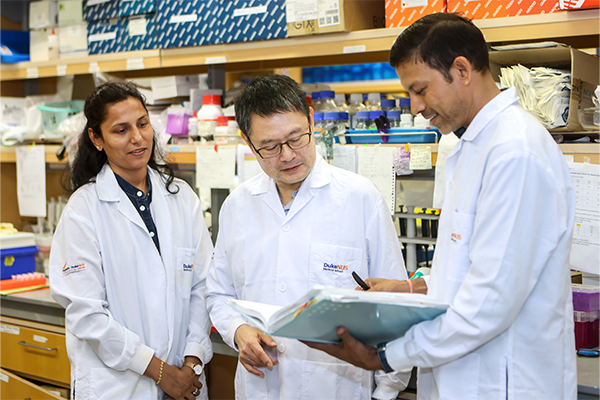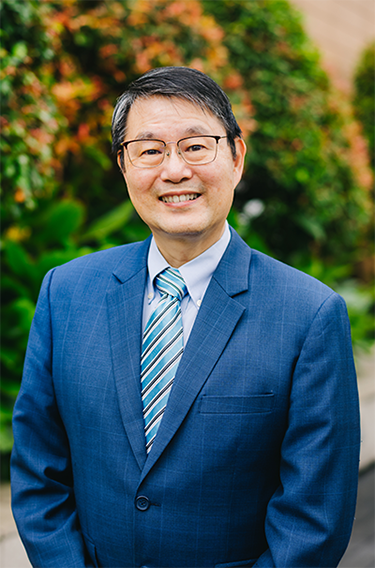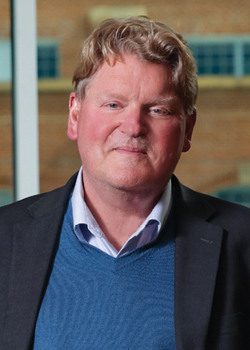
Fatty liver disease happens when a person’s body begins to store fat in the liver, which can damage the organ. Some forms of fatty liver disease are caused by excessive alcohol use. However, one in three Americans develop fatty liver from metabolic dysfunction-associated steatotic liver disease (MASLD), which is often correlated with obesity and diabetes. MASLD is now the most common liver disease worldwide.
One severe form of MASLD is called metabolic dysfunction-associated steatohepatitis (MASH). It is estimated that up to 250 million people worldwide have some form of MASH. If left untreated, many of these patients will develop cirrhosis, where healthy cells are replaced by scar tissue. Damage done by cirrhosis is irreversible, and the only treatment is liver transplantation.

Previously, the only treatment plan for MASH was diet and exercise, but in March 2024, the U.S Food and Drug Administration approved the use of Resmetirom, a thyroid hormone-like drug for MASH. The laboratory of Paul M. Yen, MD, professor in the Cardiovascular and Metabolic Disorders Program at Duke-NUS Medical School and the Duke University School of Medicine Department of Medicine, provided much of the preclinical and clinical evidence for this therapy based upon its studies of thyroid hormones and MASH. This drug goes to the liver selectively and acts on specific thyroid hormone receptors to reduce side effects on the heart and bone.
“We are excited by the recent approval of the thyromimetic Resemetirom to treat MASH,” Yen said. “Similar to thyroid hormone, Resmetirom will slow the progress or reverse liver fat accumulation, inflammation, and fibrosis in some patients. It offers hope for patients with advanced MASH approaching cirrhosis, since it may be able to prevent or forestall the development of cirrhosis and the need for liver transplantation.”
Patients with MASH are unable to metabolize fat, so it accumulates unchecked in the liver. When excess fat cannot be removed from the liver, it can cause inflammation and scarring.
Yen and his team, in collaboration with Chris Newgard, PhD, W. David and Sarah W. Stedman Distinguished Professor of Nutrition in the School of Medicine, first discovered in 2012 that thyroid hormone could stimulate the fat removal process, slowing the accumulation of fat and liver injury.

Further studies helped clarify the cellular mechanisms regulating this process. Yen’s group found that thyroid hormone enhances fatty acid metabolism by stimulating the creation and breakdown of mitochondria and eliminating inflammation-causing complexes in the liver. They also found that thyroid hormone could reverse inflammation and fibrosis in a dietary mouse model of MASH in which mice were fed a Western diet and fructose.
Yen’s group led the first clinical study showing that thyroid hormone could reverse MASLD by reducing fatty liver in diabetic men from Singapore.
Currently, Yen’s laboratory is interested in determining whether thyroid hormone can have beneficial effects in other tissues that undergo inflammation and fibrosis during diabetes and obesity, such as the heart, muscle, and kidney. They also are examining the effects of thyroid hormones on cells in the immune system to see if there are beneficial effects beyond the liver cell.
While Yen and his group were instrumental in bringing a new treatment for MASH to patients, there is still work to do to be able to treat more patients worldwide. New drugs for MASH are beyond the financial reach of many patients, particularly those living in developing countries. “I believe that low-dose thyroid hormone also may be effective for MASH, as we saw in our mouse studies, and in a pilot clinical study for fatty liver,” Yen said. “This would provide a cheaper alternative for patients with MASH in developing countries.”
Yen is currently looking for funding opportunities with non-governmental organizations and sponsors to try to conduct such a clinical study.
###
Collaborators include Rohit Sinha, PhD; Brijesh Singh, PhD; Zhou Jin, PhD; Eveline Bruinstroop, MD; Donald McDonnell, PhD; Ayako Suzuki, MD, PhD; Dwight Koeberl, MD, PhD